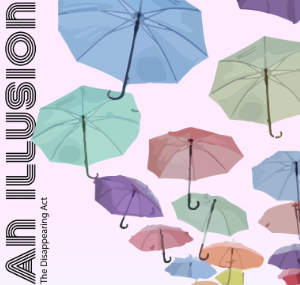It is, perhaps, fitting that Texas indie-rock band The Disappearing Act has named its most recent album “An Illusion.” Now you see them, now you don’t, or at least you never will in a live setting. That’s because the three-piece is staunchly dedicated to keeping The Disappearing Act as a studio-only project. But what a project it is. The band – Salim Nourallah (a lauded recording artist and producer), Bob Blumenfeld (Nourallah’s musical-partner-in-crime on the two previous Disappearing Act albums), and newest member John Dufilho (an established musician who has worked with Nourallah in the past on other projects) – are longtime friends who have tapped into a beautiful musical vein. With a variety of sounds and textures among the songs on the album, it’s feast for the ears, and we love it all. We sat down recently with the whole band to get to the nitty-gritty about “An Illusion.”
AMPLIFY:You have a terrific new album that just came out in September called “An Illusion.” One of the songs on the album, “Why Is Everybody So Damn Happy?,” is really great and stood out to me. What can you tell us about this song? What inspired you to write it and what is it about?
BOB BLUMENFELD: This is our “anti” song. It is the anti-happy, happy song. The anti-Salim, Salim song. The anti-survival, survivor song. It began as a rare experiment for me writing on keyboards, an instrument I do not ordinarily play and should probably avoid. The earliest incarnation – a rough keyboard-only mix – did not make much of an impression on Salim, who bypassed it for other song ideas to work on. With my “no song left behind” attitude, I continued to work on it, adding a draft bass line by Andrea Perry from Austin. I then passed it off to John, who nailed putting it together into the form you hear now. The re-energized, upbeat mix caught Salim’s interest – leading to the anti-happy, happy song that we are pleased now has made it onto the LP and made it as one of our singles.

AMPLIFY: What was it like recording this album overall?
SALIM NOURALLAH: Overall, it was a joyous, harmonious experience. Bob and John are two of my closest friends. I’m very grateful to be in this group with them.
AMPLIFY: How did this song, in particular, come together?
SALIM: When I heard the backing track Bob and John had assembled, I thought it was kind of ridiculous in the way that it was so goddamn happy. I thought it would be amusing for the “singer” to be in the opposite mood of the music. So I set about doing that.
AMPLIFY: What do you hope this album conveys to those who listen to it?
SALIM: I hope it conveys a sense that there is still music being made that can take you to far-off worlds that exist in your imagination. The 1960s were a fertile time for music that did that, and, although I wouldn’t say our sound is a throwback to the ’60’s, we’re ultimately striving to achieve a similar affect of artists like Pink Floyd, The Beatles, and The Zombies.
AMPLIFY:If you look back over your career, you probably feel like quite a different artist now than when you began for a number of reasons – life experience, industry experience, studio and performing experience all factoring into that. Do different things inspire you now? Where do you tend to get your biggest inspiration from these days?
JOHN DUFILHO: When I was younger, writing songs would be fictional, just making things up. I also feel like I spent a good amount
of time trying to be clever. Now, I’m much more interested in just telling the truth. It’s generally stranger and ends up making for better art.
SALIM: Life inspires me. My friends inspire me. My children inspire me. My partner inspires me. Inspiration is all around; there’s a never-ending supply. I feel like it would be impossible to not be inspired on a daily basis. You just have to pay attention to what others are saying, and pay attention to the world around you.
AMPLIFY: Songwriting can be a really personal endeavor, yet when you release a song or an album or an EP, you share the music with so many people. How does this make you feel, and is it ever difficult to share songs widely like that?
SALIM: The only difficult part is dealing with the business side of things and setting up releases. Most everybody I know in music now is basically managing themselves. The actual release of the music always feels exciting and also like a bit of a relief that it’s coming out. Each individual release feels like it’s yet another message being figuratively put in a bottle and cast into a vast ocean. Who knows who it will find its way to?
AMPLIFY: What kind of feedback do you get from fans who have connected with the music or had a song impact them in a deep and meaningful way?
SALIM: I’ve gotten all kinds of lovely feedback from fans over the years. I especially love hearing the personal stories – stories of people getting married to songs, listening on vacations or during important moments in their life. It’s the greatest honor to be part of someone’s life in this way.
AMPLIFY: What has been the most exciting thing to happen for you this year?
SALIM: I celebrated another birthday. At this point, that’s the most exciting thing I have to offer. Far more exciting to me than another achievement or accolade. I think if you’d asked me this question when I was twenty-two, I would’ve had a much different answer.
AMPLIFY: Got any tour plans? Where can fans see you on the road?
SALIM: The Disappearing Act is strictly a recording project so we won’t be playing shows soon, or ever. Even if Taylor Swift begs us! John and I have many years of playing live shows and wanted to focus on a project that channeled the attitude The Beatles had in 1968 – making songs that will only exist as recordings.


